People Management in Organisations: A Case Study of Google UK Ltd.
VerifiedAdded on 2023/06/17
|9
|3866
|77
Report
AI Summary
This report provides an analysis of organisational behaviour within Google UK Ltd., focusing on the company's culture, politics, and power dynamics. It examines the impact of organisational culture on individuals and teams, highlighting both positive and negative aspects, and explores the influence of politics and power on employee productivity and motivation. The report also delves into various motivation theories, such as content and process theories, and reflects on the importance of goal setting and feedback. Furthermore, it distinguishes between effective and ineffective teams, discussing team development theories like Belbin and Tuckman, emphasizing the significance of communication, coordination, and a healthy work environment. The analysis concludes by underscoring the role of leadership in fostering a positive and productive organisational culture within Google UK Ltd.
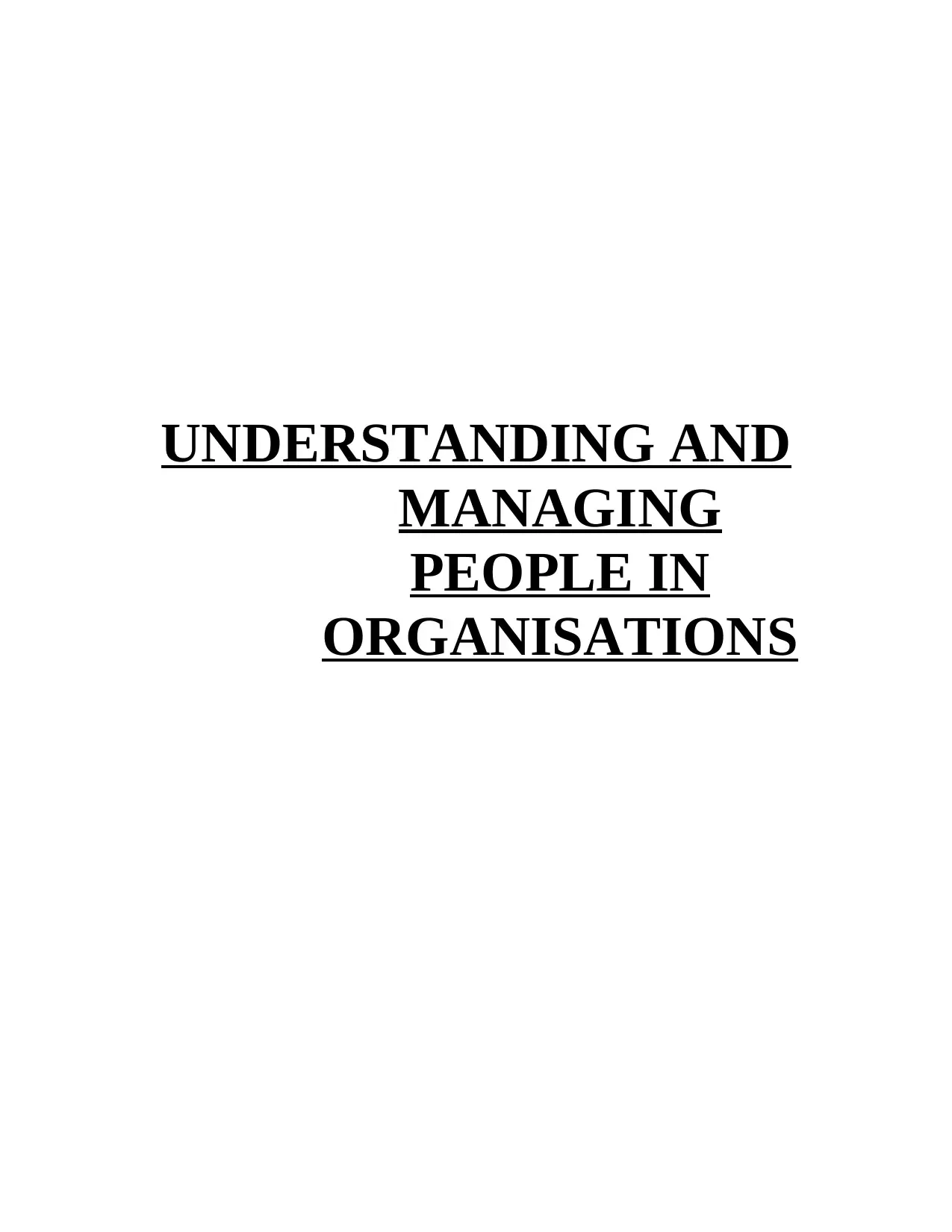
UNDERSTANDING AND
MANAGING
PEOPLE IN
ORGANISATIONS
MANAGING
PEOPLE IN
ORGANISATIONS
Paraphrase This Document
Need a fresh take? Get an instant paraphrase of this document with our AI Paraphraser
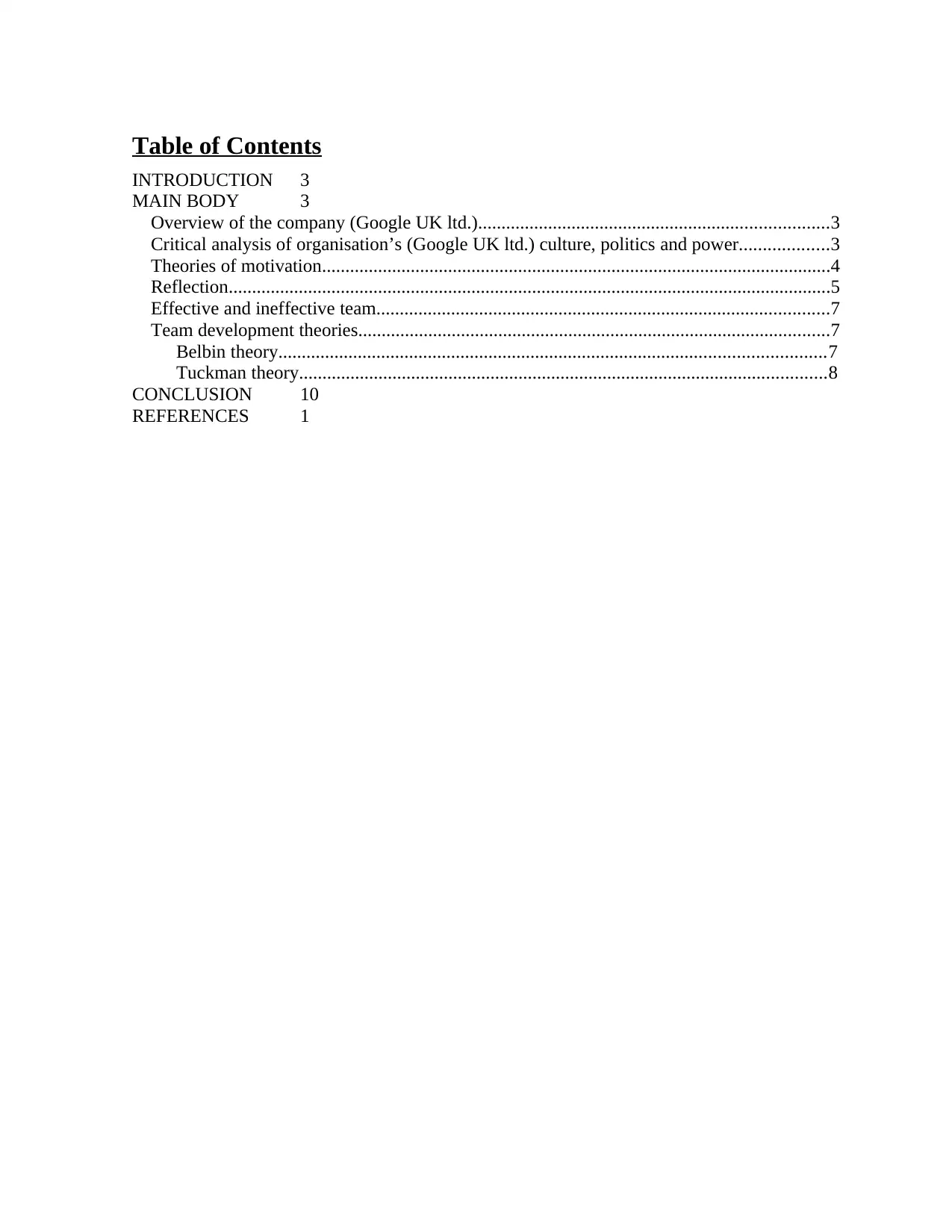
Table of Contents
INTRODUCTION 3
MAIN BODY 3
Overview of the company (Google UK ltd.)...........................................................................3
Critical analysis of organisation’s (Google UK ltd.) culture, politics and power...................3
Theories of motivation.............................................................................................................4
Reflection.................................................................................................................................5
Effective and ineffective team.................................................................................................7
Team development theories.....................................................................................................7
Belbin theory.....................................................................................................................7
Tuckman theory.................................................................................................................8
CONCLUSION 10
REFERENCES 1
INTRODUCTION 3
MAIN BODY 3
Overview of the company (Google UK ltd.)...........................................................................3
Critical analysis of organisation’s (Google UK ltd.) culture, politics and power...................3
Theories of motivation.............................................................................................................4
Reflection.................................................................................................................................5
Effective and ineffective team.................................................................................................7
Team development theories.....................................................................................................7
Belbin theory.....................................................................................................................7
Tuckman theory.................................................................................................................8
CONCLUSION 10
REFERENCES 1
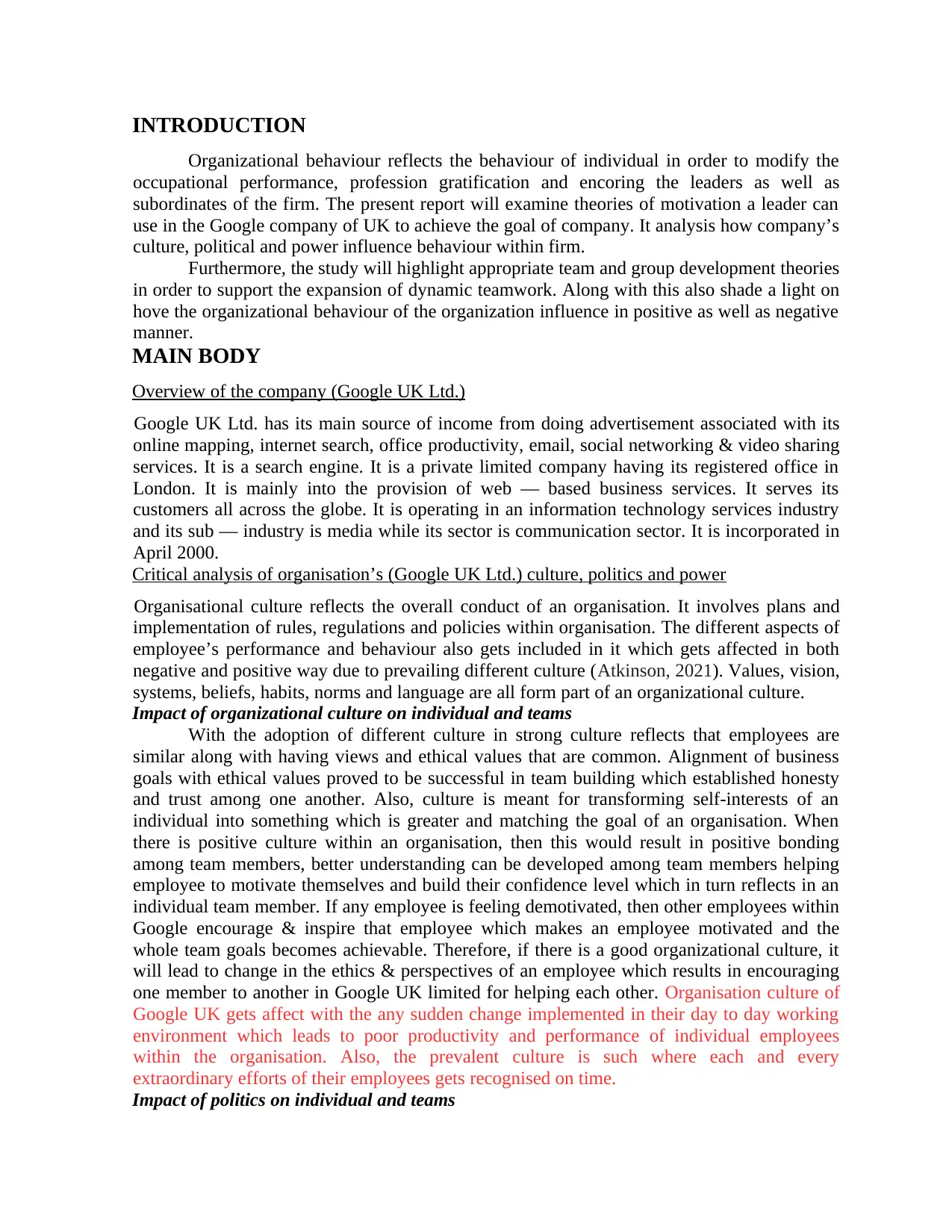
INTRODUCTION
Organizational behaviour reflects the behaviour of individual in order to modify the
occupational performance, profession gratification and encoring the leaders as well as
subordinates of the firm. The present report will examine theories of motivation a leader can
use in the Google company of UK to achieve the goal of company. It analysis how company’s
culture, political and power influence behaviour within firm.
Furthermore, the study will highlight appropriate team and group development theories
in order to support the expansion of dynamic teamwork. Along with this also shade a light on
hove the organizational behaviour of the organization influence in positive as well as negative
manner.
MAIN BODY
Overview of the company (Google UK Ltd.)
Google UK Ltd. has its main source of income from doing advertisement associated with its
online mapping, internet search, office productivity, email, social networking & video sharing
services. It is a search engine. It is a private limited company having its registered office in
London. It is mainly into the provision of web — based business services. It serves its
customers all across the globe. It is operating in an information technology services industry
and its sub — industry is media while its sector is communication sector. It is incorporated in
April 2000.
Critical analysis of organisation’s (Google UK Ltd.) culture, politics and power
Organisational culture reflects the overall conduct of an organisation. It involves plans and
implementation of rules, regulations and policies within organisation. The different aspects of
employee’s performance and behaviour also gets included in it which gets affected in both
negative and positive way due to prevailing different culture (Atkinson, 2021). Values, vision,
systems, beliefs, habits, norms and language are all form part of an organizational culture.
Impact of organizational culture on individual and teams
With the adoption of different culture in strong culture reflects that employees are
similar along with having views and ethical values that are common. Alignment of business
goals with ethical values proved to be successful in team building which established honesty
and trust among one another. Also, culture is meant for transforming self-interests of an
individual into something which is greater and matching the goal of an organisation. When
there is positive culture within an organisation, then this would result in positive bonding
among team members, better understanding can be developed among team members helping
employee to motivate themselves and build their confidence level which in turn reflects in an
individual team member. If any employee is feeling demotivated, then other employees within
Google encourage & inspire that employee which makes an employee motivated and the
whole team goals becomes achievable. Therefore, if there is a good organizational culture, it
will lead to change in the ethics & perspectives of an employee which results in encouraging
one member to another in Google UK limited for helping each other. Organisation culture of
Google UK gets affect with the any sudden change implemented in their day to day working
environment which leads to poor productivity and performance of individual employees
within the organisation. Also, the prevalent culture is such where each and every
extraordinary efforts of their employees gets recognised on time.
Impact of politics on individual and teams
Organizational behaviour reflects the behaviour of individual in order to modify the
occupational performance, profession gratification and encoring the leaders as well as
subordinates of the firm. The present report will examine theories of motivation a leader can
use in the Google company of UK to achieve the goal of company. It analysis how company’s
culture, political and power influence behaviour within firm.
Furthermore, the study will highlight appropriate team and group development theories
in order to support the expansion of dynamic teamwork. Along with this also shade a light on
hove the organizational behaviour of the organization influence in positive as well as negative
manner.
MAIN BODY
Overview of the company (Google UK Ltd.)
Google UK Ltd. has its main source of income from doing advertisement associated with its
online mapping, internet search, office productivity, email, social networking & video sharing
services. It is a search engine. It is a private limited company having its registered office in
London. It is mainly into the provision of web — based business services. It serves its
customers all across the globe. It is operating in an information technology services industry
and its sub — industry is media while its sector is communication sector. It is incorporated in
April 2000.
Critical analysis of organisation’s (Google UK Ltd.) culture, politics and power
Organisational culture reflects the overall conduct of an organisation. It involves plans and
implementation of rules, regulations and policies within organisation. The different aspects of
employee’s performance and behaviour also gets included in it which gets affected in both
negative and positive way due to prevailing different culture (Atkinson, 2021). Values, vision,
systems, beliefs, habits, norms and language are all form part of an organizational culture.
Impact of organizational culture on individual and teams
With the adoption of different culture in strong culture reflects that employees are
similar along with having views and ethical values that are common. Alignment of business
goals with ethical values proved to be successful in team building which established honesty
and trust among one another. Also, culture is meant for transforming self-interests of an
individual into something which is greater and matching the goal of an organisation. When
there is positive culture within an organisation, then this would result in positive bonding
among team members, better understanding can be developed among team members helping
employee to motivate themselves and build their confidence level which in turn reflects in an
individual team member. If any employee is feeling demotivated, then other employees within
Google encourage & inspire that employee which makes an employee motivated and the
whole team goals becomes achievable. Therefore, if there is a good organizational culture, it
will lead to change in the ethics & perspectives of an employee which results in encouraging
one member to another in Google UK limited for helping each other. Organisation culture of
Google UK gets affect with the any sudden change implemented in their day to day working
environment which leads to poor productivity and performance of individual employees
within the organisation. Also, the prevalent culture is such where each and every
extraordinary efforts of their employees gets recognised on time.
Impact of politics on individual and teams
⊘ This is a preview!⊘
Do you want full access?
Subscribe today to unlock all pages.

Trusted by 1+ million students worldwide
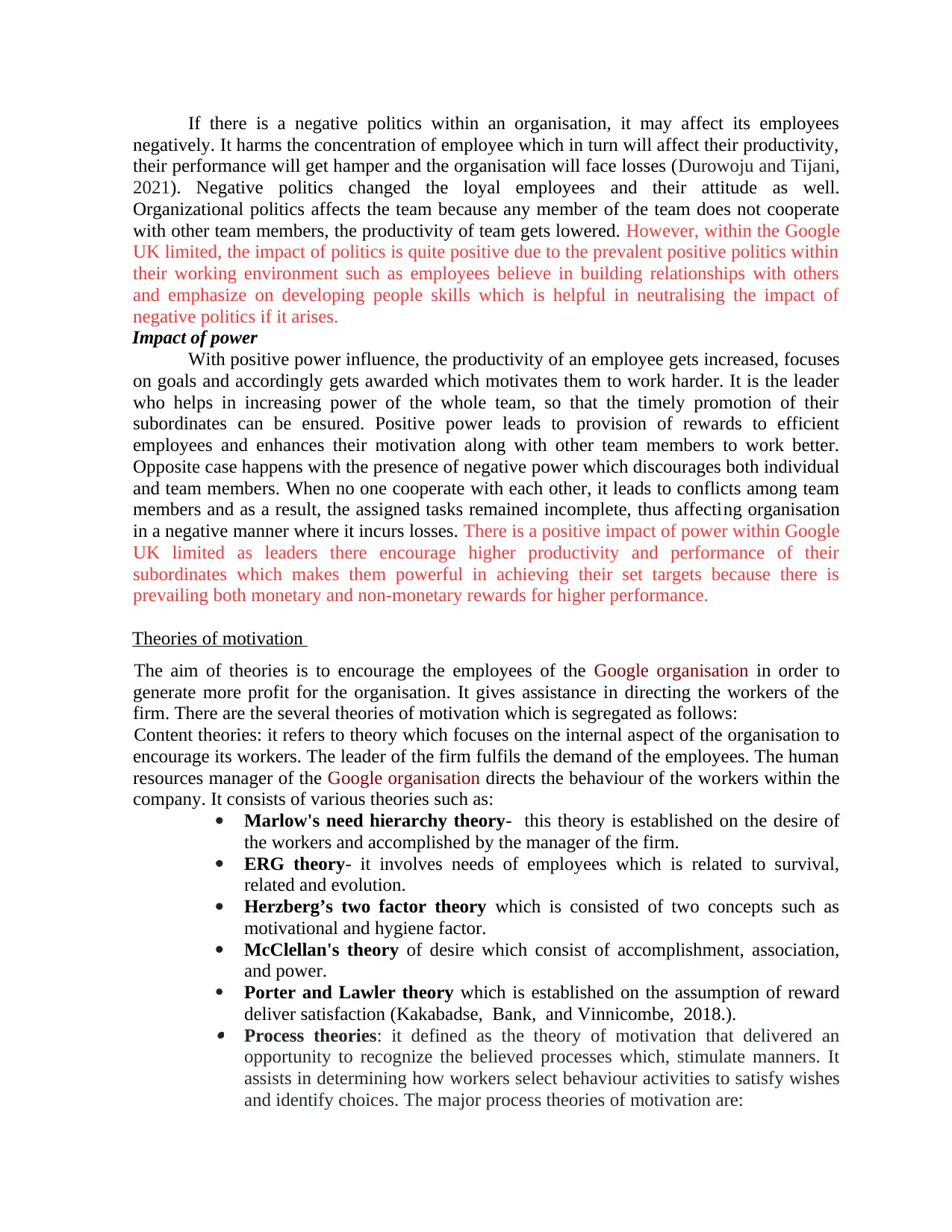
If there is a negative politics within an organisation, it may affect its employees
negatively. It harms the concentration of employee which in turn will affect their productivity,
their performance will get hamper and the organisation will face losses (Durowoju and Tijani,
2021). Negative politics changed the loyal employees and their attitude as well.
Organizational politics affects the team because any member of the team does not cooperate
with other team members, the productivity of team gets lowered. However, within the Google
UK limited, the impact of politics is quite positive due to the prevalent positive politics within
their working environment such as employees believe in building relationships with others
and emphasize on developing people skills which is helpful in neutralising the impact of
negative politics if it arises.
Impact of power
With positive power influence, the productivity of an employee gets increased, focuses
on goals and accordingly gets awarded which motivates them to work harder. It is the leader
who helps in increasing power of the whole team, so that the timely promotion of their
subordinates can be ensured. Positive power leads to provision of rewards to efficient
employees and enhances their motivation along with other team members to work better.
Opposite case happens with the presence of negative power which discourages both individual
and team members. When no one cooperate with each other, it leads to conflicts among team
members and as a result, the assigned tasks remained incomplete, thus affecting organisation
in a negative manner where it incurs losses. There is a positive impact of power within Google
UK limited as leaders there encourage higher productivity and performance of their
subordinates which makes them powerful in achieving their set targets because there is
prevailing both monetary and non-monetary rewards for higher performance.
Theories of motivation
The aim of theories is to encourage the employees of the Google organisation in order to
generate more profit for the organisation. It gives assistance in directing the workers of the
firm. There are the several theories of motivation which is segregated as follows:
Content theories: it refers to theory which focuses on the internal aspect of the organisation to
encourage its workers. The leader of the firm fulfils the demand of the employees. The human
resources manager of the Google organisation directs the behaviour of the workers within the
company. It consists of various theories such as:
Marlow's need hierarchy theory- this theory is established on the desire of
the workers and accomplished by the manager of the firm.
ERG theory- it involves needs of employees which is related to survival,
related and evolution.
Herzberg’s two factor theory which is consisted of two concepts such as
motivational and hygiene factor.
McClellan's theory of desire which consist of accomplishment, association,
and power.
Porter and Lawler theory which is established on the assumption of reward
deliver satisfaction (Kakabadse, Bank, and Vinnicombe, 2018.).
Process theories: it defined as the theory of motivation that delivered an
opportunity to recognize the believed processes which, stimulate manners. It
assists in determining how workers select behaviour activities to satisfy wishes
and identify choices. The major process theories of motivation are:
negatively. It harms the concentration of employee which in turn will affect their productivity,
their performance will get hamper and the organisation will face losses (Durowoju and Tijani,
2021). Negative politics changed the loyal employees and their attitude as well.
Organizational politics affects the team because any member of the team does not cooperate
with other team members, the productivity of team gets lowered. However, within the Google
UK limited, the impact of politics is quite positive due to the prevalent positive politics within
their working environment such as employees believe in building relationships with others
and emphasize on developing people skills which is helpful in neutralising the impact of
negative politics if it arises.
Impact of power
With positive power influence, the productivity of an employee gets increased, focuses
on goals and accordingly gets awarded which motivates them to work harder. It is the leader
who helps in increasing power of the whole team, so that the timely promotion of their
subordinates can be ensured. Positive power leads to provision of rewards to efficient
employees and enhances their motivation along with other team members to work better.
Opposite case happens with the presence of negative power which discourages both individual
and team members. When no one cooperate with each other, it leads to conflicts among team
members and as a result, the assigned tasks remained incomplete, thus affecting organisation
in a negative manner where it incurs losses. There is a positive impact of power within Google
UK limited as leaders there encourage higher productivity and performance of their
subordinates which makes them powerful in achieving their set targets because there is
prevailing both monetary and non-monetary rewards for higher performance.
Theories of motivation
The aim of theories is to encourage the employees of the Google organisation in order to
generate more profit for the organisation. It gives assistance in directing the workers of the
firm. There are the several theories of motivation which is segregated as follows:
Content theories: it refers to theory which focuses on the internal aspect of the organisation to
encourage its workers. The leader of the firm fulfils the demand of the employees. The human
resources manager of the Google organisation directs the behaviour of the workers within the
company. It consists of various theories such as:
Marlow's need hierarchy theory- this theory is established on the desire of
the workers and accomplished by the manager of the firm.
ERG theory- it involves needs of employees which is related to survival,
related and evolution.
Herzberg’s two factor theory which is consisted of two concepts such as
motivational and hygiene factor.
McClellan's theory of desire which consist of accomplishment, association,
and power.
Porter and Lawler theory which is established on the assumption of reward
deliver satisfaction (Kakabadse, Bank, and Vinnicombe, 2018.).
Process theories: it defined as the theory of motivation that delivered an
opportunity to recognize the believed processes which, stimulate manners. It
assists in determining how workers select behaviour activities to satisfy wishes
and identify choices. The major process theories of motivation are:
Paraphrase This Document
Need a fresh take? Get an instant paraphrase of this document with our AI Paraphraser
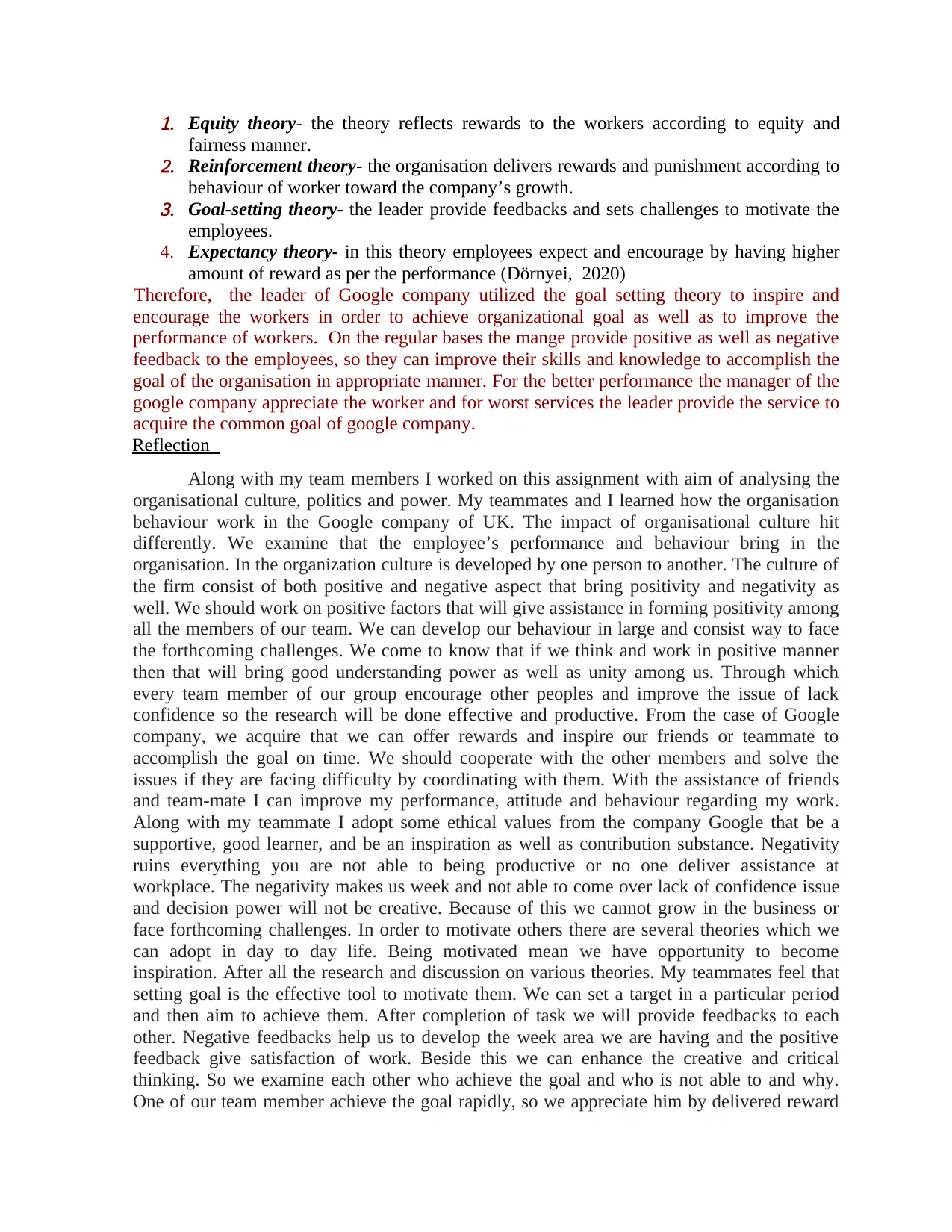
1. Equity theory- the theory reflects rewards to the workers according to equity and
fairness manner.
2. Reinforcement theory- the organisation delivers rewards and punishment according to
behaviour of worker toward the company’s growth.
3. Goal-setting theory- the leader provide feedbacks and sets challenges to motivate the
employees.
4. Expectancy theory- in this theory employees expect and encourage by having higher
amount of reward as per the performance (Dörnyei, 2020)
Therefore, the leader of Google company utilized the goal setting theory to inspire and
encourage the workers in order to achieve organizational goal as well as to improve the
performance of workers. On the regular bases the mange provide positive as well as negative
feedback to the employees, so they can improve their skills and knowledge to accomplish the
goal of the organisation in appropriate manner. For the better performance the manager of the
google company appreciate the worker and for worst services the leader provide the service to
acquire the common goal of google company.
Reflection
Along with my team members I worked on this assignment with aim of analysing the
organisational culture, politics and power. My teammates and I learned how the organisation
behaviour work in the Google company of UK. The impact of organisational culture hit
differently. We examine that the employee’s performance and behaviour bring in the
organisation. In the organization culture is developed by one person to another. The culture of
the firm consist of both positive and negative aspect that bring positivity and negativity as
well. We should work on positive factors that will give assistance in forming positivity among
all the members of our team. We can develop our behaviour in large and consist way to face
the forthcoming challenges. We come to know that if we think and work in positive manner
then that will bring good understanding power as well as unity among us. Through which
every team member of our group encourage other peoples and improve the issue of lack
confidence so the research will be done effective and productive. From the case of Google
company, we acquire that we can offer rewards and inspire our friends or teammate to
accomplish the goal on time. We should cooperate with the other members and solve the
issues if they are facing difficulty by coordinating with them. With the assistance of friends
and team-mate I can improve my performance, attitude and behaviour regarding my work.
Along with my teammate I adopt some ethical values from the company Google that be a
supportive, good learner, and be an inspiration as well as contribution substance. Negativity
ruins everything you are not able to being productive or no one deliver assistance at
workplace. The negativity makes us week and not able to come over lack of confidence issue
and decision power will not be creative. Because of this we cannot grow in the business or
face forthcoming challenges. In order to motivate others there are several theories which we
can adopt in day to day life. Being motivated mean we have opportunity to become
inspiration. After all the research and discussion on various theories. My teammates feel that
setting goal is the effective tool to motivate them. We can set a target in a particular period
and then aim to achieve them. After completion of task we will provide feedbacks to each
other. Negative feedbacks help us to develop the week area we are having and the positive
feedback give satisfaction of work. Beside this we can enhance the creative and critical
thinking. So we examine each other who achieve the goal and who is not able to and why.
One of our team member achieve the goal rapidly, so we appreciate him by delivered reward
fairness manner.
2. Reinforcement theory- the organisation delivers rewards and punishment according to
behaviour of worker toward the company’s growth.
3. Goal-setting theory- the leader provide feedbacks and sets challenges to motivate the
employees.
4. Expectancy theory- in this theory employees expect and encourage by having higher
amount of reward as per the performance (Dörnyei, 2020)
Therefore, the leader of Google company utilized the goal setting theory to inspire and
encourage the workers in order to achieve organizational goal as well as to improve the
performance of workers. On the regular bases the mange provide positive as well as negative
feedback to the employees, so they can improve their skills and knowledge to accomplish the
goal of the organisation in appropriate manner. For the better performance the manager of the
google company appreciate the worker and for worst services the leader provide the service to
acquire the common goal of google company.
Reflection
Along with my team members I worked on this assignment with aim of analysing the
organisational culture, politics and power. My teammates and I learned how the organisation
behaviour work in the Google company of UK. The impact of organisational culture hit
differently. We examine that the employee’s performance and behaviour bring in the
organisation. In the organization culture is developed by one person to another. The culture of
the firm consist of both positive and negative aspect that bring positivity and negativity as
well. We should work on positive factors that will give assistance in forming positivity among
all the members of our team. We can develop our behaviour in large and consist way to face
the forthcoming challenges. We come to know that if we think and work in positive manner
then that will bring good understanding power as well as unity among us. Through which
every team member of our group encourage other peoples and improve the issue of lack
confidence so the research will be done effective and productive. From the case of Google
company, we acquire that we can offer rewards and inspire our friends or teammate to
accomplish the goal on time. We should cooperate with the other members and solve the
issues if they are facing difficulty by coordinating with them. With the assistance of friends
and team-mate I can improve my performance, attitude and behaviour regarding my work.
Along with my teammate I adopt some ethical values from the company Google that be a
supportive, good learner, and be an inspiration as well as contribution substance. Negativity
ruins everything you are not able to being productive or no one deliver assistance at
workplace. The negativity makes us week and not able to come over lack of confidence issue
and decision power will not be creative. Because of this we cannot grow in the business or
face forthcoming challenges. In order to motivate others there are several theories which we
can adopt in day to day life. Being motivated mean we have opportunity to become
inspiration. After all the research and discussion on various theories. My teammates feel that
setting goal is the effective tool to motivate them. We can set a target in a particular period
and then aim to achieve them. After completion of task we will provide feedbacks to each
other. Negative feedbacks help us to develop the week area we are having and the positive
feedback give satisfaction of work. Beside this we can enhance the creative and critical
thinking. So we examine each other who achieve the goal and who is not able to and why.
One of our team member achieve the goal rapidly, so we appreciate him by delivered reward
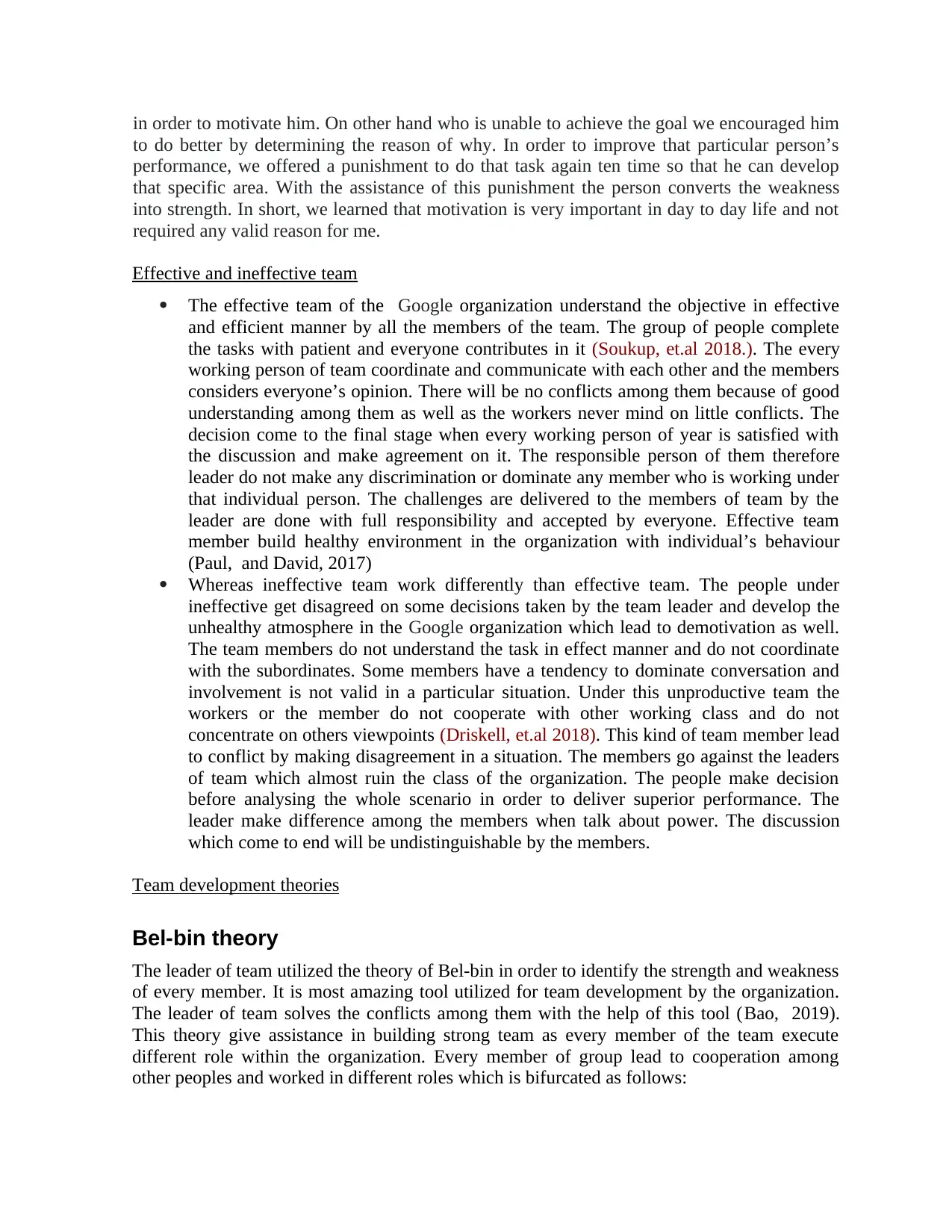
in order to motivate him. On other hand who is unable to achieve the goal we encouraged him
to do better by determining the reason of why. In order to improve that particular person’s
performance, we offered a punishment to do that task again ten time so that he can develop
that specific area. With the assistance of this punishment the person converts the weakness
into strength. In short, we learned that motivation is very important in day to day life and not
required any valid reason for me.
Effective and ineffective team
The effective team of the Google organization understand the objective in effective
and efficient manner by all the members of the team. The group of people complete
the tasks with patient and everyone contributes in it (Soukup, et.al 2018.). The every
working person of team coordinate and communicate with each other and the members
considers everyone’s opinion. There will be no conflicts among them because of good
understanding among them as well as the workers never mind on little conflicts. The
decision come to the final stage when every working person of year is satisfied with
the discussion and make agreement on it. The responsible person of them therefore
leader do not make any discrimination or dominate any member who is working under
that individual person. The challenges are delivered to the members of team by the
leader are done with full responsibility and accepted by everyone. Effective team
member build healthy environment in the organization with individual’s behaviour
(Paul, and David, 2017)
Whereas ineffective team work differently than effective team. The people under
ineffective get disagreed on some decisions taken by the team leader and develop the
unhealthy atmosphere in the Google organization which lead to demotivation as well.
The team members do not understand the task in effect manner and do not coordinate
with the subordinates. Some members have a tendency to dominate conversation and
involvement is not valid in a particular situation. Under this unproductive team the
workers or the member do not cooperate with other working class and do not
concentrate on others viewpoints (Driskell, et.al 2018). This kind of team member lead
to conflict by making disagreement in a situation. The members go against the leaders
of team which almost ruin the class of the organization. The people make decision
before analysing the whole scenario in order to deliver superior performance. The
leader make difference among the members when talk about power. The discussion
which come to end will be undistinguishable by the members.
Team development theories
Bel-bin theory
The leader of team utilized the theory of Bel-bin in order to identify the strength and weakness
of every member. It is most amazing tool utilized for team development by the organization.
The leader of team solves the conflicts among them with the help of this tool (Bao, 2019).
This theory give assistance in building strong team as every member of the team execute
different role within the organization. Every member of group lead to cooperation among
other peoples and worked in different roles which is bifurcated as follows:
to do better by determining the reason of why. In order to improve that particular person’s
performance, we offered a punishment to do that task again ten time so that he can develop
that specific area. With the assistance of this punishment the person converts the weakness
into strength. In short, we learned that motivation is very important in day to day life and not
required any valid reason for me.
Effective and ineffective team
The effective team of the Google organization understand the objective in effective
and efficient manner by all the members of the team. The group of people complete
the tasks with patient and everyone contributes in it (Soukup, et.al 2018.). The every
working person of team coordinate and communicate with each other and the members
considers everyone’s opinion. There will be no conflicts among them because of good
understanding among them as well as the workers never mind on little conflicts. The
decision come to the final stage when every working person of year is satisfied with
the discussion and make agreement on it. The responsible person of them therefore
leader do not make any discrimination or dominate any member who is working under
that individual person. The challenges are delivered to the members of team by the
leader are done with full responsibility and accepted by everyone. Effective team
member build healthy environment in the organization with individual’s behaviour
(Paul, and David, 2017)
Whereas ineffective team work differently than effective team. The people under
ineffective get disagreed on some decisions taken by the team leader and develop the
unhealthy atmosphere in the Google organization which lead to demotivation as well.
The team members do not understand the task in effect manner and do not coordinate
with the subordinates. Some members have a tendency to dominate conversation and
involvement is not valid in a particular situation. Under this unproductive team the
workers or the member do not cooperate with other working class and do not
concentrate on others viewpoints (Driskell, et.al 2018). This kind of team member lead
to conflict by making disagreement in a situation. The members go against the leaders
of team which almost ruin the class of the organization. The people make decision
before analysing the whole scenario in order to deliver superior performance. The
leader make difference among the members when talk about power. The discussion
which come to end will be undistinguishable by the members.
Team development theories
Bel-bin theory
The leader of team utilized the theory of Bel-bin in order to identify the strength and weakness
of every member. It is most amazing tool utilized for team development by the organization.
The leader of team solves the conflicts among them with the help of this tool (Bao, 2019).
This theory give assistance in building strong team as every member of the team execute
different role within the organization. Every member of group lead to cooperation among
other peoples and worked in different roles which is bifurcated as follows:
⊘ This is a preview!⊘
Do you want full access?
Subscribe today to unlock all pages.

Trusted by 1+ million students worldwide
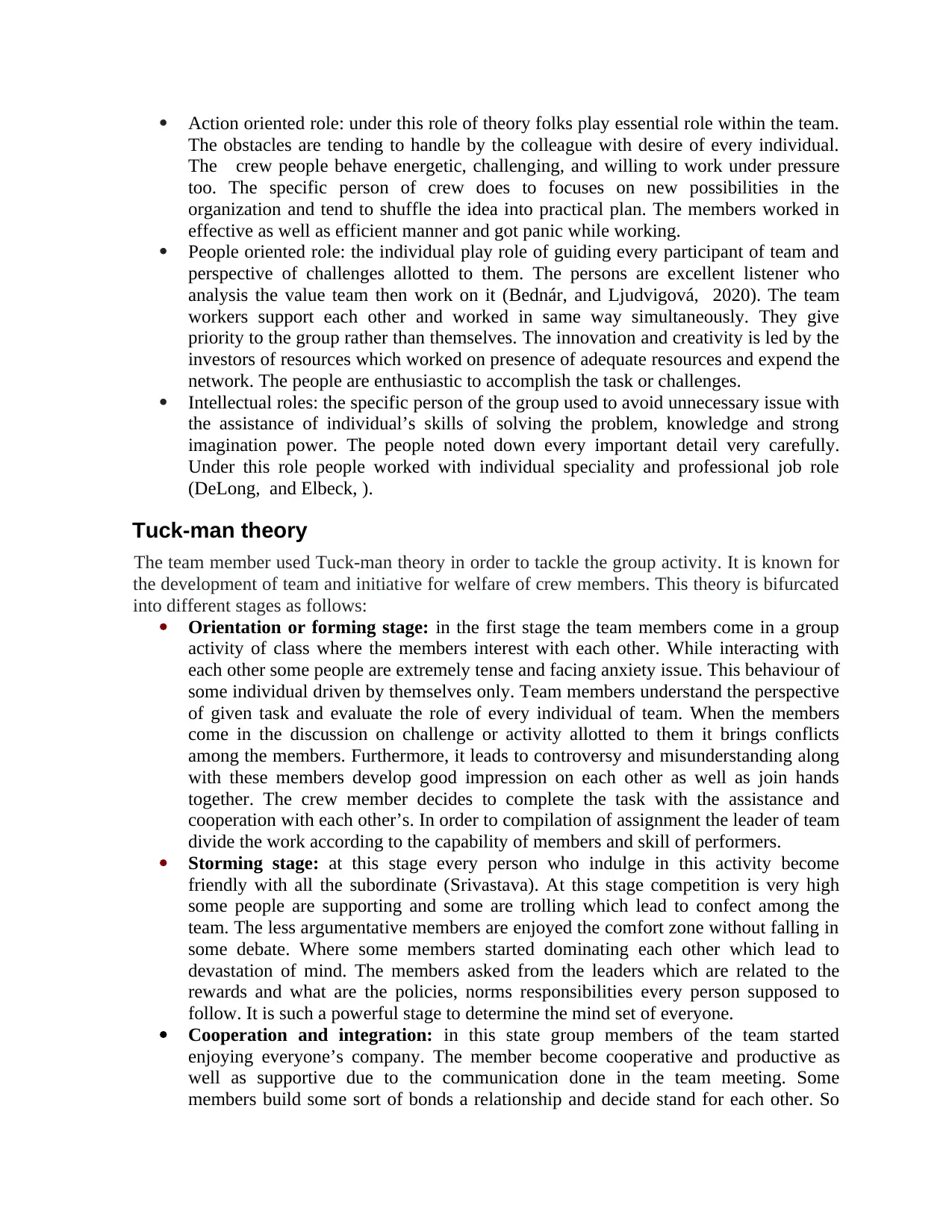
Action oriented role: under this role of theory folks play essential role within the team.
The obstacles are tending to handle by the colleague with desire of every individual.
The crew people behave energetic, challenging, and willing to work under pressure
too. The specific person of crew does to focuses on new possibilities in the
organization and tend to shuffle the idea into practical plan. The members worked in
effective as well as efficient manner and got panic while working.
People oriented role: the individual play role of guiding every participant of team and
perspective of challenges allotted to them. The persons are excellent listener who
analysis the value team then work on it (Bednár, and Ljudvigová, 2020). The team
workers support each other and worked in same way simultaneously. They give
priority to the group rather than themselves. The innovation and creativity is led by the
investors of resources which worked on presence of adequate resources and expend the
network. The people are enthusiastic to accomplish the task or challenges.
Intellectual roles: the specific person of the group used to avoid unnecessary issue with
the assistance of individual’s skills of solving the problem, knowledge and strong
imagination power. The people noted down every important detail very carefully.
Under this role people worked with individual speciality and professional job role
(DeLong, and Elbeck, ).
Tuck-man theory
The team member used Tuck-man theory in order to tackle the group activity. It is known for
the development of team and initiative for welfare of crew members. This theory is bifurcated
into different stages as follows:
Orientation or forming stage: in the first stage the team members come in a group
activity of class where the members interest with each other. While interacting with
each other some people are extremely tense and facing anxiety issue. This behaviour of
some individual driven by themselves only. Team members understand the perspective
of given task and evaluate the role of every individual of team. When the members
come in the discussion on challenge or activity allotted to them it brings conflicts
among the members. Furthermore, it leads to controversy and misunderstanding along
with these members develop good impression on each other as well as join hands
together. The crew member decides to complete the task with the assistance and
cooperation with each other’s. In order to compilation of assignment the leader of team
divide the work according to the capability of members and skill of performers.
Storming stage: at this stage every person who indulge in this activity become
friendly with all the subordinate (Srivastava). At this stage competition is very high
some people are supporting and some are trolling which lead to confect among the
team. The less argumentative members are enjoyed the comfort zone without falling in
some debate. Where some members started dominating each other which lead to
devastation of mind. The members asked from the leaders which are related to the
rewards and what are the policies, norms responsibilities every person supposed to
follow. It is such a powerful stage to determine the mind set of everyone.
Cooperation and integration: in this state group members of the team started
enjoying everyone’s company. The member become cooperative and productive as
well as supportive due to the communication done in the team meeting. Some
members build some sort of bonds a relationship and decide stand for each other. So
The obstacles are tending to handle by the colleague with desire of every individual.
The crew people behave energetic, challenging, and willing to work under pressure
too. The specific person of crew does to focuses on new possibilities in the
organization and tend to shuffle the idea into practical plan. The members worked in
effective as well as efficient manner and got panic while working.
People oriented role: the individual play role of guiding every participant of team and
perspective of challenges allotted to them. The persons are excellent listener who
analysis the value team then work on it (Bednár, and Ljudvigová, 2020). The team
workers support each other and worked in same way simultaneously. They give
priority to the group rather than themselves. The innovation and creativity is led by the
investors of resources which worked on presence of adequate resources and expend the
network. The people are enthusiastic to accomplish the task or challenges.
Intellectual roles: the specific person of the group used to avoid unnecessary issue with
the assistance of individual’s skills of solving the problem, knowledge and strong
imagination power. The people noted down every important detail very carefully.
Under this role people worked with individual speciality and professional job role
(DeLong, and Elbeck, ).
Tuck-man theory
The team member used Tuck-man theory in order to tackle the group activity. It is known for
the development of team and initiative for welfare of crew members. This theory is bifurcated
into different stages as follows:
Orientation or forming stage: in the first stage the team members come in a group
activity of class where the members interest with each other. While interacting with
each other some people are extremely tense and facing anxiety issue. This behaviour of
some individual driven by themselves only. Team members understand the perspective
of given task and evaluate the role of every individual of team. When the members
come in the discussion on challenge or activity allotted to them it brings conflicts
among the members. Furthermore, it leads to controversy and misunderstanding along
with these members develop good impression on each other as well as join hands
together. The crew member decides to complete the task with the assistance and
cooperation with each other’s. In order to compilation of assignment the leader of team
divide the work according to the capability of members and skill of performers.
Storming stage: at this stage every person who indulge in this activity become
friendly with all the subordinate (Srivastava). At this stage competition is very high
some people are supporting and some are trolling which lead to confect among the
team. The less argumentative members are enjoyed the comfort zone without falling in
some debate. Where some members started dominating each other which lead to
devastation of mind. The members asked from the leaders which are related to the
rewards and what are the policies, norms responsibilities every person supposed to
follow. It is such a powerful stage to determine the mind set of everyone.
Cooperation and integration: in this state group members of the team started
enjoying everyone’s company. The member become cooperative and productive as
well as supportive due to the communication done in the team meeting. Some
members build some sort of bonds a relationship and decide stand for each other. So
Paraphrase This Document
Need a fresh take? Get an instant paraphrase of this document with our AI Paraphraser
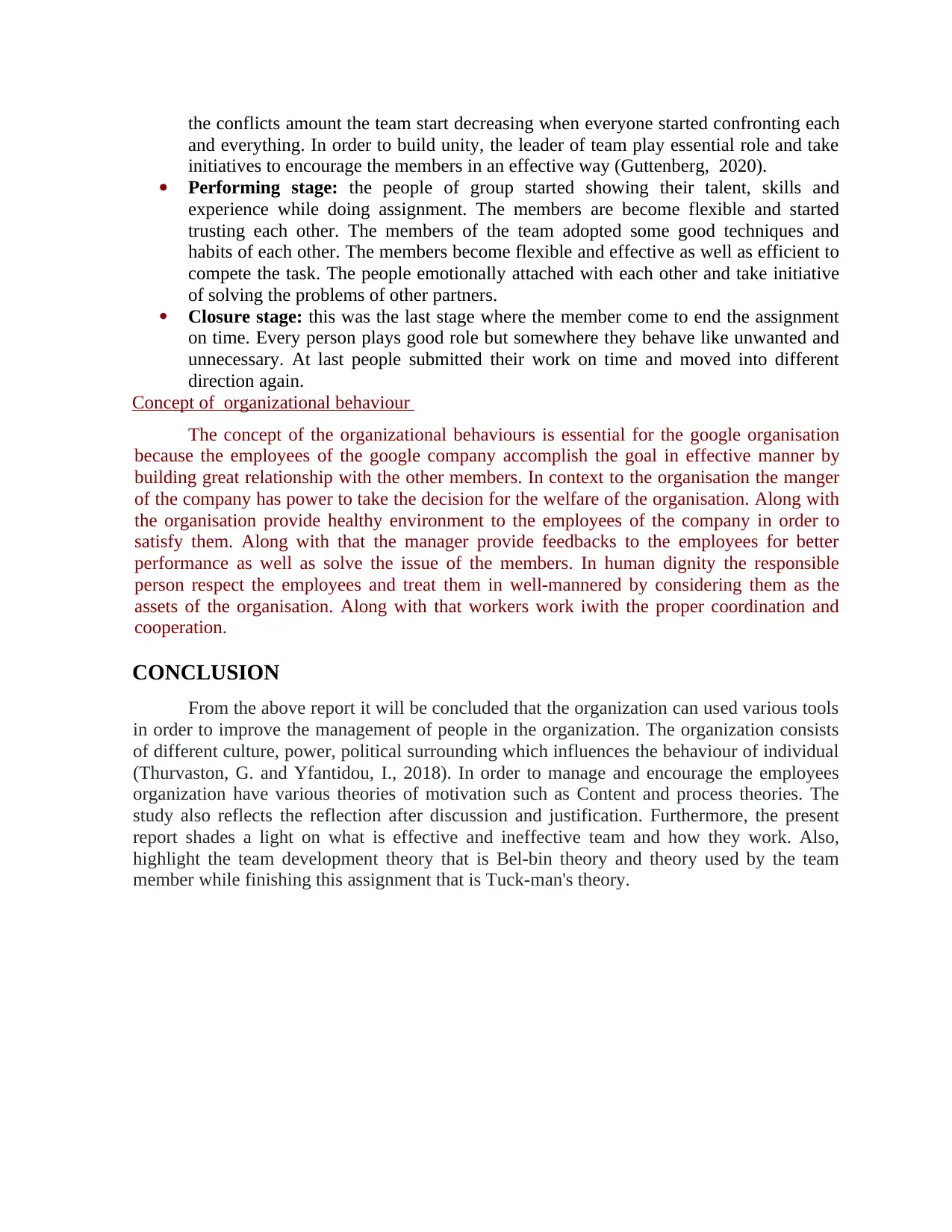
the conflicts amount the team start decreasing when everyone started confronting each
and everything. In order to build unity, the leader of team play essential role and take
initiatives to encourage the members in an effective way (Guttenberg, 2020).
Performing stage: the people of group started showing their talent, skills and
experience while doing assignment. The members are become flexible and started
trusting each other. The members of the team adopted some good techniques and
habits of each other. The members become flexible and effective as well as efficient to
compete the task. The people emotionally attached with each other and take initiative
of solving the problems of other partners.
Closure stage: this was the last stage where the member come to end the assignment
on time. Every person plays good role but somewhere they behave like unwanted and
unnecessary. At last people submitted their work on time and moved into different
direction again.
Concept of organizational behaviour
The concept of the organizational behaviours is essential for the google organisation
because the employees of the google company accomplish the goal in effective manner by
building great relationship with the other members. In context to the organisation the manger
of the company has power to take the decision for the welfare of the organisation. Along with
the organisation provide healthy environment to the employees of the company in order to
satisfy them. Along with that the manager provide feedbacks to the employees for better
performance as well as solve the issue of the members. In human dignity the responsible
person respect the employees and treat them in well-mannered by considering them as the
assets of the organisation. Along with that workers work iwith the proper coordination and
cooperation.
CONCLUSION
From the above report it will be concluded that the organization can used various tools
in order to improve the management of people in the organization. The organization consists
of different culture, power, political surrounding which influences the behaviour of individual
(Thurvaston, G. and Yfantidou, I., 2018). In order to manage and encourage the employees
organization have various theories of motivation such as Content and process theories. The
study also reflects the reflection after discussion and justification. Furthermore, the present
report shades a light on what is effective and ineffective team and how they work. Also,
highlight the team development theory that is Bel-bin theory and theory used by the team
member while finishing this assignment that is Tuck-man's theory.
and everything. In order to build unity, the leader of team play essential role and take
initiatives to encourage the members in an effective way (Guttenberg, 2020).
Performing stage: the people of group started showing their talent, skills and
experience while doing assignment. The members are become flexible and started
trusting each other. The members of the team adopted some good techniques and
habits of each other. The members become flexible and effective as well as efficient to
compete the task. The people emotionally attached with each other and take initiative
of solving the problems of other partners.
Closure stage: this was the last stage where the member come to end the assignment
on time. Every person plays good role but somewhere they behave like unwanted and
unnecessary. At last people submitted their work on time and moved into different
direction again.
Concept of organizational behaviour
The concept of the organizational behaviours is essential for the google organisation
because the employees of the google company accomplish the goal in effective manner by
building great relationship with the other members. In context to the organisation the manger
of the company has power to take the decision for the welfare of the organisation. Along with
the organisation provide healthy environment to the employees of the company in order to
satisfy them. Along with that the manager provide feedbacks to the employees for better
performance as well as solve the issue of the members. In human dignity the responsible
person respect the employees and treat them in well-mannered by considering them as the
assets of the organisation. Along with that workers work iwith the proper coordination and
cooperation.
CONCLUSION
From the above report it will be concluded that the organization can used various tools
in order to improve the management of people in the organization. The organization consists
of different culture, power, political surrounding which influences the behaviour of individual
(Thurvaston, G. and Yfantidou, I., 2018). In order to manage and encourage the employees
organization have various theories of motivation such as Content and process theories. The
study also reflects the reflection after discussion and justification. Furthermore, the present
report shades a light on what is effective and ineffective team and how they work. Also,
highlight the team development theory that is Bel-bin theory and theory used by the team
member while finishing this assignment that is Tuck-man's theory.
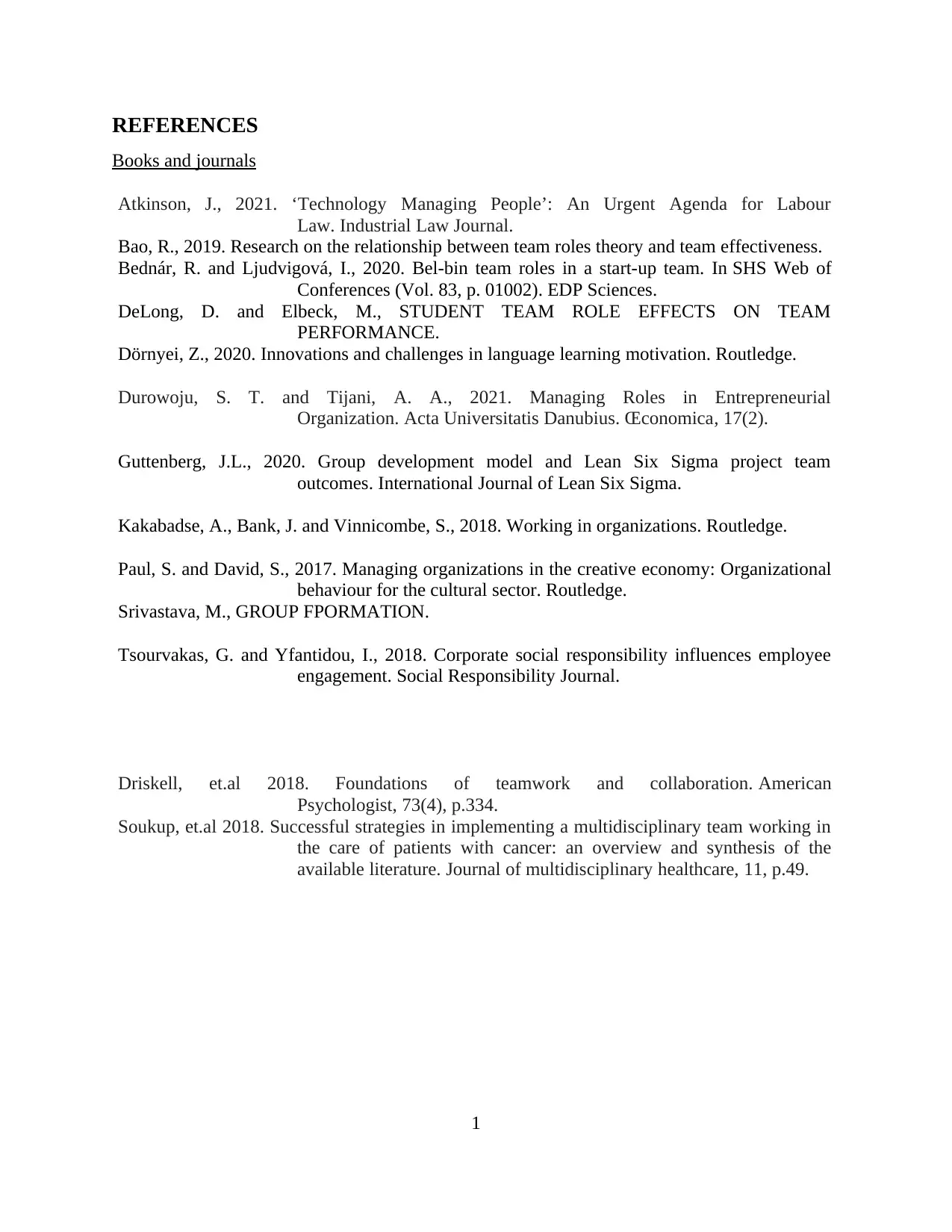
REFERENCES
Books and journals
Atkinson, J., 2021. ‘Technology Managing People’: An Urgent Agenda for Labour
Law. Industrial Law Journal.
Bao, R., 2019. Research on the relationship between team roles theory and team effectiveness.
Bednár, R. and Ljudvigová, I., 2020. Bel-bin team roles in a start-up team. In SHS Web of
Conferences (Vol. 83, p. 01002). EDP Sciences.
DeLong, D. and Elbeck, M., STUDENT TEAM ROLE EFFECTS ON TEAM
PERFORMANCE.
Dörnyei, Z., 2020. Innovations and challenges in language learning motivation. Routledge.
Durowoju, S. T. and Tijani, A. A., 2021. Managing Roles in Entrepreneurial
Organization. Acta Universitatis Danubius. Œconomica, 17(2).
Guttenberg, J.L., 2020. Group development model and Lean Six Sigma project team
outcomes. International Journal of Lean Six Sigma.
Kakabadse, A., Bank, J. and Vinnicombe, S., 2018. Working in organizations. Routledge.
Paul, S. and David, S., 2017. Managing organizations in the creative economy: Organizational
behaviour for the cultural sector. Routledge.
Srivastava, M., GROUP FPORMATION.
Tsourvakas, G. and Yfantidou, I., 2018. Corporate social responsibility influences employee
engagement. Social Responsibility Journal.
Driskell, et.al 2018. Foundations of teamwork and collaboration. American
Psychologist, 73(4), p.334.
Soukup, et.al 2018. Successful strategies in implementing a multidisciplinary team working in
the care of patients with cancer: an overview and synthesis of the
available literature. Journal of multidisciplinary healthcare, 11, p.49.
1
Books and journals
Atkinson, J., 2021. ‘Technology Managing People’: An Urgent Agenda for Labour
Law. Industrial Law Journal.
Bao, R., 2019. Research on the relationship between team roles theory and team effectiveness.
Bednár, R. and Ljudvigová, I., 2020. Bel-bin team roles in a start-up team. In SHS Web of
Conferences (Vol. 83, p. 01002). EDP Sciences.
DeLong, D. and Elbeck, M., STUDENT TEAM ROLE EFFECTS ON TEAM
PERFORMANCE.
Dörnyei, Z., 2020. Innovations and challenges in language learning motivation. Routledge.
Durowoju, S. T. and Tijani, A. A., 2021. Managing Roles in Entrepreneurial
Organization. Acta Universitatis Danubius. Œconomica, 17(2).
Guttenberg, J.L., 2020. Group development model and Lean Six Sigma project team
outcomes. International Journal of Lean Six Sigma.
Kakabadse, A., Bank, J. and Vinnicombe, S., 2018. Working in organizations. Routledge.
Paul, S. and David, S., 2017. Managing organizations in the creative economy: Organizational
behaviour for the cultural sector. Routledge.
Srivastava, M., GROUP FPORMATION.
Tsourvakas, G. and Yfantidou, I., 2018. Corporate social responsibility influences employee
engagement. Social Responsibility Journal.
Driskell, et.al 2018. Foundations of teamwork and collaboration. American
Psychologist, 73(4), p.334.
Soukup, et.al 2018. Successful strategies in implementing a multidisciplinary team working in
the care of patients with cancer: an overview and synthesis of the
available literature. Journal of multidisciplinary healthcare, 11, p.49.
1
⊘ This is a preview!⊘
Do you want full access?
Subscribe today to unlock all pages.

Trusted by 1+ million students worldwide
1 out of 9
Related Documents
Your All-in-One AI-Powered Toolkit for Academic Success.
+13062052269
info@desklib.com
Available 24*7 on WhatsApp / Email
![[object Object]](/_next/static/media/star-bottom.7253800d.svg)
Unlock your academic potential
Copyright © 2020–2026 A2Z Services. All Rights Reserved. Developed and managed by ZUCOL.




